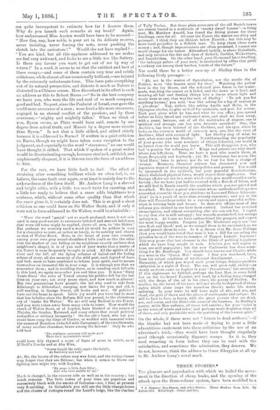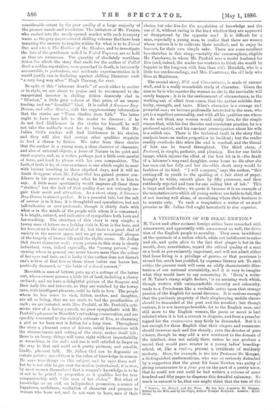THREE STORIES.• Tits: pleasure and approbation with which we bailed
the move- ment in the direction of cheap books, and the opening of the attack upon the three-volume system, have been modified to a
• A Summer Day-Dream, and other Stories. Three Stud es from Life. By Julian Ord. Edinburgh: Grant and Son. considerable extent by the poor quality of a large majority of the pioneer novels and novelettes. The imitators of Mr. Fergus, who rushed into the newly-opened market with such trumpery wares as the grey-paper-covered shilling volumes that have been tempting the unwary to inquire within for what is to be Found Out, and who is The Brother of the Shadow, and to investigate the fate of the gentleman veiled in Tinted Vapours, are as bold as they are numerous. The quantity of absolutely worthless fiction for which the story that made for the author of Called Back a sudden reputation, soon quenched in death, is innocently accountable, is portentous, and moderate experimentation in it would justify one in declaring against shilling literature such "a very long way after" Hugh Conway, for ever.
In spite of this "inhuman dearth" of merit either in matter or in style, we are about to praise and to recommend to the exasperated investor in shilling fiction demurely clad in " Silurian," a little grey volume at that price, of an unpre- tending and un-" dreadful " kind. It is called A Sammie). Day- Dream, and other Stories, with the supplementary information that the stories are " Three Studies from Life." The latter ought to have been left to the reader to discover ; if be do not find lifelikeness in the stories for himself, he will not take the author's word for its being there. But Mr. Julian Ord's readers will find lifelikeness in his stories, and they will also find certain other qualities requisite to lend a charm to fiction. We infer from these stories that the author is a young man, a close observer of character, and also of external objects, a lover of Nature in its quiet and rural aspects, and, as a writer, perhaps just a little over-careful of form, and hard to please with his own composition. The fault, if fault it be, of over-exactness is one which ought to meet with lenient handling in these slipshod days, and it will no doubt disappear when Mr. Julian Ord has gained greater con- fidence in his power of saying what ho has got it in him to say. A little more spontaneity would improve all these three "studies," but the lack of that quality does not seriously im- pair their merit and attraction. As a short story, A Summer Day-Dream is almost perfect. It is a peaceful tale, but the salt of sorrow is in it too; it is thoughtful and speculative, but not tall-talkative or over-profound ; though it chiefly deals with what is in the minds of the people with whom it is concerned ; it is bright, natural, and indicative of sympathies both keen and far-reaching. The structure of this story is very simple ; a towny man of letters on a holiday visit in Kent is the hero, and his love-story is the material of it ; but there is a great deal of variety in the narrow space, and we get an occasional glimpse of the tragedy of human life amid the idyllic scene. Mr. Julian Ord draws character well; every person in this story is clearly individual, even, indeed especially, the "young person," con- cerning whom in general one never knows more than the colour of her eyes and hair, and is lucky if the author does not disturb one's notion of that two or three times before one leaves her, poetically deceased, or " the bride of a ducal coronet."
Meredith (a man of letters) puts up at a cottage of the better sort, whose owners possess a little bit of land, including a cherry orchard ; and we have a delightful picture of the Seagurs and their daily life and interests, as they are watched by the towny man, with intelligent pleasure, until he falls in love. The people whom he has come to visit, father, mother, and daughter, are all so living, that we are made to feel the peculiarities of each ; we get irritated, with Mrs. Penfold, at Mr. Penfold's opti- mistic view of a losing rursuit, we grow sympathetic with Mr. Penfold's pleasure in Meredith's refreshing conversation, and are speedily converted to the visitor's estimate of Eva, as charming a girl as we have met in fiction for a long time. Throughout the story a pleasant sense of leisure, subtly harmonious with the circumstances and setting of the story, makes itself felt ; there is no hurry, things will come right without improbability or wrenching, in the end ; and one is well satisfied to linger on the way to that end amid flush pretty pictures, and sensible, kindly, pleasant talk. Mr. Julian Ord can be dogmatic on certain points ; one of them is the value of knowledge in women. He says true things on this subject, and he says them well bat he is not able to get over the notion (entertained, it is true, by most women themselves) that a woman's knowledge is to be or not to be prized in proportion as it qualifies her for true companionship with " the man of her choice." Bnt what of knowledge as an end, an independent possession, a source of happiness, usefulness, exaltation of character and purpose to women who have not, and do not want to have, men of their choice, but who live for the acquisition of knowledge and the use of it, without caring in the least whether they are approved or disapproved by the opposite sex ? It is difficult for a man, especially a young man, to realise that there are women whose nature it is to cultivate their intellect, and to enjoy its harvest, for their own simple sake. There are some excellent bye-sketches in this story,—notably the commonplace, eligible Mr. Fanshawe, in whom Mr. Penfold sees a model husband for Eva (and, indeed, the reader too ventures to think she would be happier in the long-run with him than with Meredith, who is a little too condescending), and Mrs. Courtenay, the of;'. lady who lives at Maidstone.
The second story, Will and Circumstance, is made of sterner stuff, and is a really remarkable study of character. Given the man as he is who marries the woman as she is, the inevitable will surely happen ; it is in the environment of circumstance, in the working-out of effect from cause, that the author exhibits dex- terity, strength, and taste. Eden's character is a strange and powerful one ; we become profoundly interested in the man, who yet is a repellent personality, and with all his qualities one whom we do not think any woman would really love, for the simple reason that, with his fine theories and consistent practice, he is a profound egotist, and his constant preoccupation about his wife is a selfish one. There is the technical fault in the story that analysis bears an undue proportion to incident ; but the reader readily overlooks this when the end is reached, and the thread of fate can be traced throughout. The third story, A Pastoral, is simple, pathetic, and pleasing. But for one feeble image, which injures the effect of the best bit in it—the death of a labourer's wayward daughter, come home to die after she has seen out her folly and her sin—this short story would be faultless of its kind. "I will compare," says the author, "this cutting-off in youth to the spoiling of a fair sheet of paper, brought to white, smooth gloss by fifty processes, and then ruthlessly rejected and torn for one soiling blot of ink." This is inept and ineffective ; we quote it because it is an example of the temptation into which all young writers are liable to fall, that of not leaving well alone, of moralising where their business is to narrate only. To such a temptation a writer of so much promise as Mr. Julian Ord ought henceforth to rise superior.





































 Previous page
Previous page